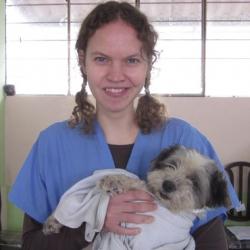Research
Genetic diversity and evolution in canine transmissible venereal tumour (CTVT)
Andrea is a postdoctoral scientist in the Transmissible Cancer Group led by Prof Elizabeth Murchison. Andrea's long-term interest is in understanding the biology of canine transmissible venereal tumour (CTVT). CTVT is one of a few known naturally occurring clonally transmissible cancers, and the disease is spread between individual dogs by the allogeneic transfer of living cancer cells during coitus. Even though CTVT originated in a dog that lived around 11,000 years ago, the cancer managed to survive beyond the death of its original host and is now widely present as a parasitic life form in the dog population worldwide.
The CTVT project, which Andrea is involved in, is aiming to understand how CTVT has emerged and spread through the population, through mapping the genetic and phenotypic diversity of CTVT tumours from different parts of the world.
Andrea completed her PhD research work in the Transmissible Cancer Group, focusing on the genome diversity and evolution of CTVT around the world, for which she has received the Kennel Club Charitable Trust Postgraduate Student Inspiration Award, Cambridge Society for the Application of Research Award and British Federation of Women Graduates Award. Prior to her PhD, she completed an undergraduate degree in Veterinary Science at the University of Cambridge. Her final year project focused on mapping the worldwide distribution and prevalence of CTVT, and she is still interested in reports of CTVT from around the world.
A video describing Andrea's most recent work is below:
Canine Transmissible Venereal Tumour: The contagious cancer that conquered the world
Publications
Baez-Ortega A, Gori K*, Strakova A*, Airikkala-Otter I, Allen JL, Allum KM, Bansse-Issa L, Bhutia TN, Bisson JL, Briceño C, Castillo Domracheva A, Corrigan AM, Hugh R. Cran HR, Crawford JT, Davis E, de Castro KF, De Nardi AB, de Vos AP, Delgadillo Keenan L, Donelan EM, Espinoza Huerta AR, Faramade IA, Fazil F, Fotopoulou E, Fruean SN, Gallardo-Arrieta F, Glebova O, Gouletsou PG, Häfelin Manrique RF, Henriques JJGP, Horta RS, Ignatenko N, Kane Y, King C, Koenig D, Krupa A, Kruzeniski SJ, Kwon YM, Lanza-Perea, Lazyan M, Lopez Quintana AM, Losfelt T, Marino G, Martínez Castañeda S, Martínez-López MF, Masuruli BM, Meyer M, Migneco EJ, Nakanwagi BN, Neal K, Neunzig W, Ní Leathlobhair M, Nixon SJ, Onsare MM, Ortega-Pacheco A, Pedraza-Ordoñez F, Peleteiro MC, Polak K, Pye RJ, Reece JF, Rojas Gutierrez J, Sadia H, Schmeling SK, Shamanova O, Sherlock AG, Stammnitz M, Steenland-Smit AE, Svitich A, Swarisch I, Tapia Martínez LJ, Thoya Ngoka IT, Torres CG, Tudor EM, van der Wel MG, Vițălaru BA, Vural SA, Walkinton W, Wang J, Wehrle-Martinez AS, Widdowson SAE, Stratton MR, Alexandrov LB, Martincorena I, Murchison EP. Somatic evolution and global expansion of an ancient transmissible cancer lineage. Science (2019). 365(6452)
Strakova, A. (2018). Genome diversity and evolution in canine transmissible venereal tumour (Doctoral thesis, University of Cambridge).
Ní Leathlobhair M*, Perri AR*, Irving-Pease EK*, Witt KE*, Linderholm A*, Haile J, Lebrasseur O, Ameen C, Blick J, Boyko AR, Brace S, Cortes YN, Crockford SJ, Devault A, Dimopoulos EA, Eldridge M, Enk J, Gopalakrishnan S, Gori K, Grimes V, Guiry E, Hansen AJ, Hulme-Beaman A, Johnson J, Kitchen A, Kasparov AK, Kwon YM, Nikolskiy PA, Lope CP, Manin A, Martin T, Meyer M, Myers KN, Omura M, Rouillard JM, Pavlova EY, Sciulli P, Sinding MS, Strakova A, Ivanova VV, Widga C, Willerslev E, Pitulko VV, Barnes I, Gilbert MTP, Dobney KM, Malhi RS, Murchison EP*, Larson G*, Frantz LAF*. The evolutionary history of dogs in the Americas. Science (2018). 361(6397):81-85.
Strakova A, Ni Leathlobhair M, Wang G-D, Yin T-T, Airikkala-Otter I, Allen JL, Allum KM, Bansse-Issa L, Bisson JL, Castillo Domracheva A, de Castro KF, Corrigan AM, Cran HR, Crawford JT, Cutter SM, Delgadillo Keenan L, Donelan EM, Faramade IA, Flores Reynoso E, Fotopoulou E, Fruean SN, Gallardo-Arrieta F, Glebova O, Häfelin Manrique RF, Henriques JJGP, Ignatenko N, Koenig D, Lanza-PereaM, Lobetti R, Lopez Quintana AM, Losfelt T, Marino G, Martincorena I, Martínez Castañeda S, Martínez-López MF, Meyer M, NakanwagiB, De Nardi AB, Neunzig W, NixonSJ, Onsare MM, Ortega-PachecoA, Peleteiro MC, PyeRJ, ReeceJF, Rojas Gutierrez J, Sadia H, Schmeling SK, Shamanova O, Ssuna RK, Steenland-Smit AE, Svitich A, Thoya Ngoka I, Vițălaru BA, de Vos AP, de Vos JP, Walkinton O, Wedge DC, Wehrle-Martinez AS, van der Wel MG, Widdowson SAE and Murchison EP. Mitochondrial genetic diversity, selection and recombination in a canine transmissible cancer. eLife. (2016); DOI: 10.7554/eLife.14552
Castro FK, Strakova A, Tinucci Costa M, Murchison EP. Evaluation of a genetic assay for canine transmissible venereal tumour diagnosis in Brazil. Vet Comp Oncol. (2016)
Strakova A and Murchison EP. The cancer which survived: Insights from the genome of an 11,000 year-old cancer. Curr. Opin. Genet. Dev. 30, 49-55 (2015)
Strakova A, Murchison EP. The changing global distribution and prevalence of canine transmissible venereal tumour. BMC Vet Res. 10, 168 (2014)



